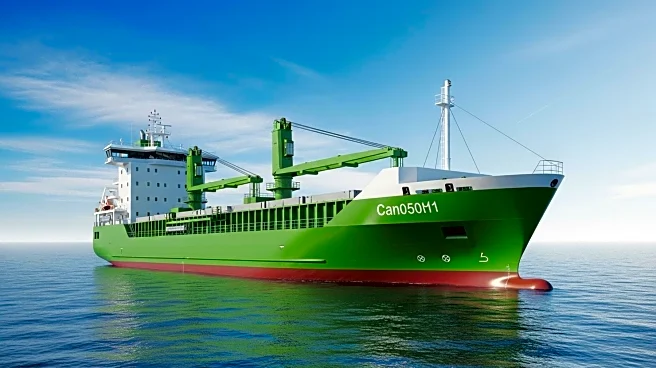What's Happening?
The International Maritime Organization (IMO) is hosting a meeting in London where nations are discussing regulations aimed at transitioning the shipping industry away from fossil fuels to reduce emissions. The proposed regulations include a global fee on greenhouse gas emissions, marking a significant step in climate action. The Trump administration opposes the proposal, threatening retaliation if adopted. The regulations, known as the 'Net-zero Framework,' would set a marine fuel standard and establish a pricing system for emissions, potentially generating significant revenue to fund green shipping initiatives. The meeting aims to finalize the framework, which could lead to a major shift in shipping practices.
Why It's Important?
The adoption of these regulations could significantly impact global shipping practices, driving a shift towards more sustainable operations. This move is crucial for reducing the industry's contribution to global emissions, which currently stands at about 3%. The regulations could set a precedent for international climate policy, demonstrating the feasibility of legally-binding climate action. The potential revenue from emissions fees could accelerate the development and adoption of green technologies, benefiting public health and marine ecosystems. However, opposition from major players like the Trump administration highlights the political challenges in achieving consensus on global climate initiatives.
What's Next?
If adopted, the regulations will come into force in 2027, with penalties for emissions starting in 2028. The IMO aims for consensus but may resort to voting if disagreements persist. The outcome of the meeting could influence future international climate negotiations and the shipping industry's approach to sustainability. The regulations could prompt shipping companies to invest in alternative fuels and technologies, reshaping industry standards. Failure to adopt the framework could delay decarbonization efforts, prolonging the industry's environmental impact. Stakeholders will closely monitor the meeting's outcome, as it could have far-reaching implications for global trade and environmental policy.
Beyond the Headlines
The proposed regulations raise concerns about the reliance on biofuels, which could impact food production and lead to deforestation. The IMO is urged to promote scalable green alternatives to avoid negative environmental consequences. The transition to green shipping is complex, requiring significant investment and innovation. The meeting highlights the need for international cooperation in addressing climate change, emphasizing the role of regulatory frameworks in driving industry-wide change. The discussions also reflect broader debates on balancing economic growth with environmental sustainability, a challenge faced by many sectors in the global economy.









